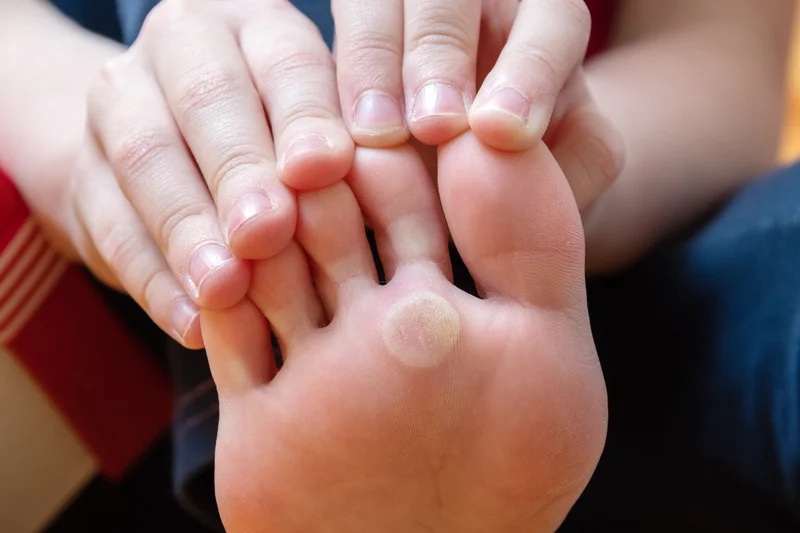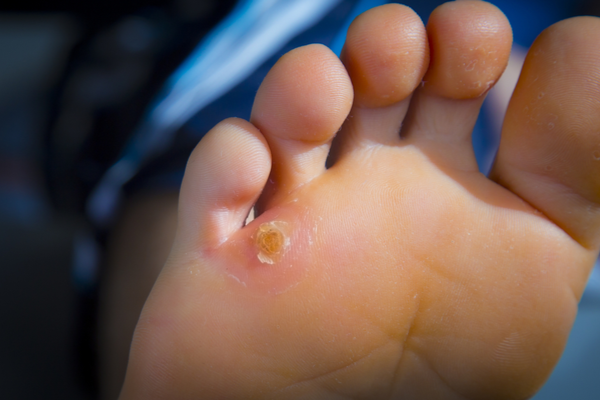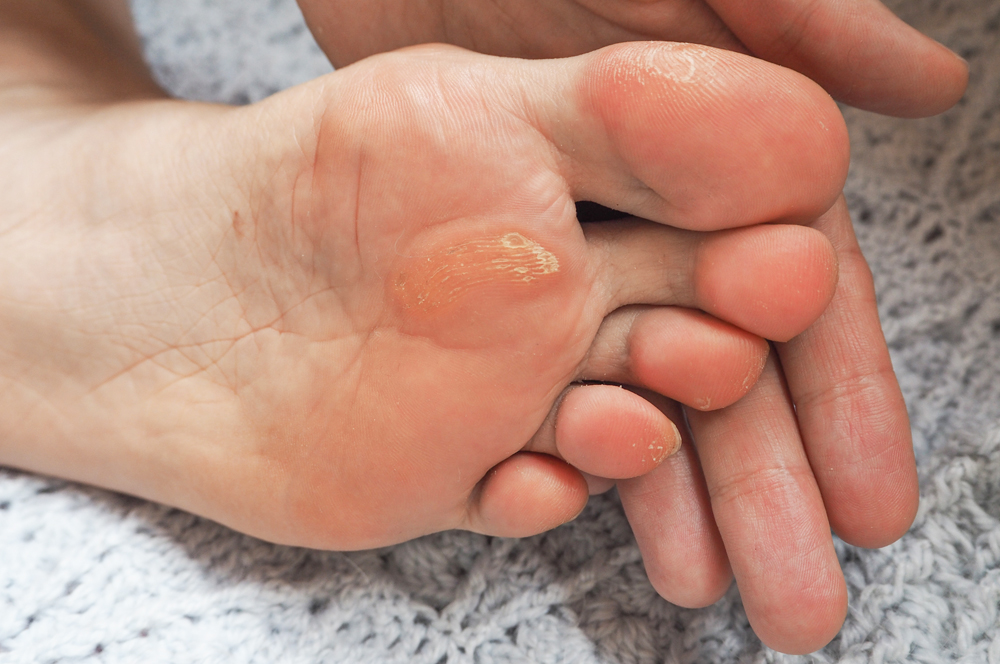Ask Ayurvedic doctor a question and get a consultation online on the problem of your concern in a free or paid mode. More than 2,000 experienced doctors work and wait for your questions on our site and help users to solve their health problems every day.
Corn Treatment in Ayurveda: Natural Remedies for Smooth and Healthy Skin

Introduction to Corns and Ayurveda
Corns are hardened, thickened areas of skin that develop due to repeated friction or pressure, commonly found on the feet, particularly on the toes or the soles. They can be painful and uncomfortable, often resulting from ill-fitting shoes or excessive walking. In Ayurveda, corns are considered an imbalance in the body's Kapha and Vata doshas, leading to the accumulation of toxins in the skin that form hard, painful bumps.
Ayurveda offers a variety of natural remedies for treating corns, focusing on balancing the doshas, softening the hardened skin, and addressing the root cause of friction and pressure. This article delves into the Ayurvedic perspective on corn treatment and provides effective solutions for preventing and managing corns with herbal remedies, dietary changes, and lifestyle practices.
Don't wait or self medicate. Start chat with Doctor NOW
Historical Roots & Ayurvedic Perspective
In Ayurveda, the development of corns is attributed to the accumulation of Kapha dosha in the skin, leading to excess moisture and thickening of the skin's outer layer. This is often aggravated by Vata, which governs movement and can increase friction and pressure on certain areas of the body. Corns are viewed as an external manifestation of an internal imbalance that needs to be corrected.
Ayurvedic treatment for corns involves addressing both the external and internal causes. By using herbal remedies to soften the skin, reduce inflammation, and improve circulation, Ayurveda helps relieve the discomfort associated with corns. Additionally, lifestyle changes such as wearing comfortable shoes and practicing regular foot care are also key components of Ayurvedic treatment.
Key Ayurvedic Remedies for Corns
1. Herbal Remedies for Softening and Healing the Skin
Ayurveda offers several herbs known for their ability to soften hardened skin, reduce inflammation, and promote healing. These herbs can be applied topically or used in therapeutic baths to alleviate the discomfort associated with corns:
- Neem (Azadirachta indica): Neem is widely used in Ayurveda for its antimicrobial and anti-inflammatory properties. It helps cleanse the skin, reduce swelling, and soothe pain. Applying a paste of neem leaves or neem oil on the affected area can help soften corns and prevent infection.
- Turmeric (Curcuma longa): Turmeric is known for its anti-inflammatory and antiseptic properties. A turmeric paste mixed with coconut oil or water can be applied to the corn to reduce swelling, soften the hardened skin, and promote healing.
- Aloe Vera (Aloe barbadensis): Aloe vera is famous for its soothing and cooling properties, making it effective in treating corns. It helps reduce pain and inflammation while moisturizing the skin. Applying fresh aloe vera gel directly onto the corn can relieve discomfort and soften the skin.
- Ginger (Zingiber officinale): Ginger helps improve blood circulation and can be applied in the form of a paste to the affected area. Its warming properties reduce the pain associated with corns and promote healing by improving circulation to the skin.
2. Foot Soaks with Ayurvedic Herbs
Soaking the feet in warm water with Ayurvedic herbs can help soften corns and provide relief from the pain and discomfort they cause. Some effective herbs for foot soaks include:
- Epsom Salt: Although not traditionally Ayurvedic, Epsom salt helps soften the skin and reduce swelling. It can be added to warm water along with Ayurvedic herbs like Turmeric or Neem for an enhanced effect.
- Lavender (Lavandula angustifolia): Lavender has anti-inflammatory and soothing properties. Adding a few drops of lavender essential oil to a warm foot soak can help relax the feet, reduce inflammation, and alleviate pain caused by corns.
- Chamomile (Matricaria chamomilla): Chamomile has a calming effect on the skin. A chamomile tea foot soak can help reduce irritation and soften the skin, making it easier to treat corns.
3. Ayurvedic Oils and Pastes
Ayurvedic oils and pastes can be applied directly to the corns to reduce hardness, ease pain, and promote healing. Commonly used oils include:
- Castor Oil: Castor oil is known for its ability to soften and nourish the skin. Applying castor oil directly to the corn and covering it with a bandage overnight can help break down the hardened tissue and promote healing.
- Sesame Oil: Sesame oil has both moisturizing and healing properties. It can be applied to the affected area to soften corns and reduce irritation, while also improving circulation in the feet.
- Mustard Oil: Mustard oil is another excellent remedy for treating corns. It has warming properties that help improve circulation and reduce the formation of corns by preventing excessive moisture retention.
4. Lifestyle Changes and Preventive Measures
In Ayurveda, treating the root cause of an issue is just as important as addressing the symptoms. To prevent corns and promote overall foot health, consider the following lifestyle adjustments:
- Footwear: Wearing comfortable, well-fitting shoes that do not put undue pressure on the feet is essential in preventing corns. Avoid shoes that are too tight or have high heels, as they can lead to excessive friction.
- Foot Care: Regularly moisturizing and exfoliating the feet is important for maintaining healthy skin. Use a gentle scrub or pumice stone to remove dead skin cells and prevent the build-up of thickened skin that can lead to corns.
- Diet: Ayurveda recommends a balanced diet that supports overall health and reduces the likelihood of Kaphaimbalances. Incorporate cooling foods like cucumbers, coconut, and leafy greens, while reducing heavy, oily, and overly processed foods.
5. Ayurvedic Detoxification
To prevent recurring corns and other skin conditions, Ayurveda suggests detoxifying the body by cleansing accumulated ama (toxins) from the system. Panchakarma therapies, such as Virechana (therapeutic purgation) and Basti (medicated enema), can help cleanse the body of toxins and restore balance to the doshas. These therapies are often recommended for individuals experiencing chronic skin issues or other imbalances that manifest as corns.
How Ayurvedic Treatment Works for Corns
Ayurvedic treatments for corns work by addressing the root cause of skin thickening, which is usually an imbalance in Kapha and Vata. Ayurvedic remedies help restore balance to these doshas, reduce friction, and soften the skin through natural herbs and oils. By improving circulation, detoxifying the body, and nourishing the skin, Ayurveda helps treat and prevent corns, leaving the feet feeling comfortable and healthy.
Choosing the Right Ayurvedic Remedies
When treating corns with Ayurvedic remedies, it’s important to consult with a qualified Ayurvedic practitioner. An Ayurvedic professional can assess your dosha balance, identify the root cause of the problem, and recommend the appropriate remedies, dosages, and lifestyle changes to help restore balance and promote healing.
Recommended Dosage & Usage
The dosage and usage of Ayurvedic remedies depend on the specific remedy being used. For topical treatments, the general recommendations are:
- Herbal Pastes: Apply a paste made from Turmeric, Neem, or Aloe Vera directly to the corn and leave it on for 20-30 minutes, 1-2 times daily, until the skin softens and the corn begins to heal.
- Foot Soaks: Soak the feet in a warm solution of Epsom Salt, Turmeric, and Neem for 15-20 minutes, 2-3 times a week to reduce inflammation and soften the skin.
- Oils: Apply Castor Oil or Sesame Oil to the affected area and cover it with a bandage overnight for a more intensive treatment.
Potential Side Effects & Precautions
Ayurvedic treatments for corns are generally safe when used as directed, but there are a few precautions to keep in mind:
- Skin Sensitivity: Some individuals may experience mild irritation or allergic reactions to certain herbs or oils. It is recommended to perform a patch test before using any new remedy.
- Pregnancy & Nursing: Pregnant or nursing women should consult an Ayurvedic practitioner before using certain herbs or oils, as some may not be suitable during pregnancy.
- Existing Medical Conditions: Individuals with existing medical conditions such as skin allergies or circulatory issues should consult with a healthcare provider before starting Ayurvedic treatments.
Frequently Asked Questions for Corn Treatment in Ayurveda
How does Ayurveda treat corns?
Ayurveda treats corns by balancing Vata and Kapha doshas, using herbs like Neem, Turmeric, and Aloe Vera to soften the skin, reduce inflammation, and soothe discomfort. Lifestyle changes such as wearing comfortable shoes and regular foot care are also important in preventing corns.
Can Ayurveda permanently remove corns?
Ayurvedic treatments can help soften and treat corns by addressing the root cause of the problem, improving circulation, and restoring balance to the skin. While corns may require ongoing care and maintenance, Ayurvedic remedies can provide long-term relief and help prevent recurrence.
What are the best herbs for treating corns in Ayurveda?
The best herbs for treating corns in Ayurveda include Neem, Turmeric, Aloe Vera, Pomegranate, and Kutaj. These herbs have anti-inflammatory, antimicrobial, and astringent properties that help treat and soothe corns.
How can I prevent corns from forming in the future?
To prevent corns, it is important to wear well-fitting shoes, avoid excessive friction, and practice regular foot care. Moisturizing and exfoliating the feet can help prevent the build-up of thickened skin that leads to corns.
Can Ayurvedic oils be used for corns?
Yes, Ayurvedic oils like Castor Oil, Sesame Oil, and Mustard Oil can be applied to corns to soften the skin, reduce pain, and promote healing. These oils help nourish the skin and improve circulation in the affected area.
Is there any side effect of using Ayurvedic remedies for corns?
Ayurvedic remedies for corns are generally safe, but some individuals may experience mild irritation or allergic reactions to certain herbs or oils. Always perform a patch test before applying any new remedy.
Where can I buy Ayurvedic remedies for corns?
You can purchase Ayurvedic remedies for corns from trusted Ayurvedic pharmacies, certified Ayurvedic practitioners, or reputable online stores specializing in Ayurvedic products.
Conclusion & Expert Insights
Ayurveda offers effective and natural remedies for treating corns, focusing on balancing the doshas, soothing inflammation, and restoring healthy skin. With the right combination of herbs, oils, and lifestyle changes, you can alleviate the discomfort caused by corns and maintain healthy, smooth feet. Always consult with a qualified Ayurvedic practitioner for personalized guidance to ensure the best results.
References & Further Reading
- Lad, V. (2002). Ayurveda: The Science of Self-Healing.
- Sharma, P.V. (1995). Ayurvedic Healing: A Comprehensive Guide.
- National Institute of Ayurveda:
- Journal of Ayurveda and Integrative Medicine for research articles on Ayurvedic remedies for skin health.



